Tax-Free Pay, 2-Year Leave of Absence for Parents Among Ideas Being Floated by House's Military Quality-of-Life Panel
Washington,
November 16, 2023
Originally published in Military.com Those are some of the "outside the box" ideas the leaders of the House Armed Services Committee's military quality-of-life panel said they are mulling as they barrel toward an early 2024 goal of providing recommendations to improve service members' pay, child care, housing and other issues key to people's decision to join or stay in the military. "You're competing with the civilian economy that has also figured out that the youngest generation wants very much to feel a purpose and sense of community, and they've met them where they are," Rep. Chrissy Houlahan, D-Pa., the ranking member of the quality-of-life panel, said at a Wednesday night event hosted by With Honor, a political action committee that supports veterans running for office."Those kids are going into those job opportunities without the obligation of PCSing every couple of years, without the obligation of living in dorms that are substandard, with pay that is significantly more in most cases than what they're going to be earning," she added. Houlahan, an Air Force veteran, was speaking alongside the panel's chairman, Rep. Don Bacon, R-Neb., a retired Air Force brigadier general. The quality-of-life panel was formed this congressional session to provide recommendations that could be included in next year's National Defense Authorization Act. The panel's final report should be done by February, Bacon said. Since formally launching over the summer, the panel has held an open hearing on housing conditions, as well as several closed-door sessions with Defense Department officials, military service organizations and military spouses about pay, child care, spouse employment and housing. Housing quality in particular has garnered increasing attention in recent months after a Government Accountability Office report highlighted systemic issues with unlivable barracks, including overflowing sewage, insect infestations and brown drinking water. The Army has said it plans to ask Congress for $4 billion to renovate and build new barracks, but has acknowledged that is only about half of what it needs, and it attributed the low ask to doubts that Congress would fund even that amount. But on Wednesday, Bacon stressed the need for the services to request exactly how much money they need to keep housing livable. "We have funded exactly what the military has wanted for barracks and dormitories. They've been given 100%-plus. Yet, we find out it's only half of what they really need," Bacon said. "I felt a little misled." On other quality-of-life issues, Bacon and Houlahan mentioned several unconventional proposals they are considering. One idea was to allow service members to take a two-year leave of absence to focus on parenting and return to the military at the same rank. While that idea was considered a few years ago and put aside, Bacon said the "time could be now" for it to become reality. Houlahan also mentioned a "GI Bill for child care" to address child-care affordability, though she did not elaborate on how exactly that proposal would work. Another idea is to make assignments longer so service members and families do not have to move as much, though Bacon acknowledged that may be impossible for troops looking to climb the career ladder who need to have a wide range of assignments. On pay issues, Bacon floated making income tax exempt at certain ranks as a way to increase take-home pay without adding to the Pentagon budget. Most military allowances are tax exempt, but basic pay is taxed. Changing what's taxed would require support from the Ways and Means Committee, but Bacon quipped that he could lean on the "patriotic" committee members. The quality-of-life panel is also looking at giving junior enlisted troops higher annual raises than more senior service members rather than the across-the-board raises that have been standard for years. "We've both been struck by the fact that the leadership in DoD and in the services will tell us that the pay is adequate," Bacon said, as Houlahan agreed. "Then how come one in eight people have to go to the food banks? You don't get a good answer on that." Bacon acknowledged that remedies for quality-of-life issues could be costly and so could take a few years for Congress to fund. For example, raising the basic allowance for housing from 95% of housing costs to 100% -- an oft-floated proposal to address housing affordability issues -- is estimated to cost $225 million each percentage point it's raised, Bacon said. "What we're recommending isn't controversial," Bacon said. "The most controversial thing is, you have to pay for it." |
In the News



